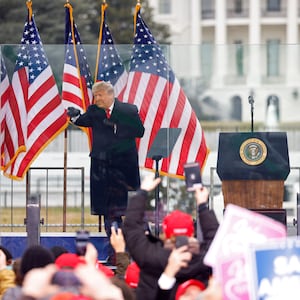High-ranking national-security officials have spent the last 24 hours scrambling to figure out how to keep their commander-in-chief, Donald Trump, from inciting further violence at home, spilling national secrets, or sparking last-minute confrontations with international foes.
The concerns in the upper echelons of the administration’s national-security community range from fears inside the Pentagon that the president will do or say something that effectively throws the U.S. into a military confrontation with another country to anxieties in the intelligence apparatus that Trump will divulge classified intelligence on his way out, according to four officials who spoke with The Daily Beast about the matter. All requested to remain anonymous in order to speak more openly about the discussions.
“This isn’t a hypothetical anymore,” said one senior administration official. “This is real. What happened yesterday changed the calculus. People are concerned about [the president’s] state of mind.”
ADVERTISEMENT
After a pro-Trump mob stormed the Capitol building Wednesday, several high-ranking national-security and White House officials were on the edge of resigning, according to two sources familiar with the matter. Officials called and texted one another, probing whether they would call it quits. Several did step down, including Deputy National Security Adviser Matt Pottinger. But after a series of calls from prominent GOP lawmakers, including Sen. Mitch McConnell (R-KY), leading national-security officials decided to stay in office, at least for the time being, in order to preserve cohesiveness but also to provide safeguards in the coming weeks. One of those individuals asked to stay on is National Security Adviser Robert O’Brien. Officials inside the State Department close to the secretary say they are unaware of any plans by Secretary of State Mike Pompeo to step down.
For those who have decided to stay on, their main focus is preventing President Trump from pushing the country further into chaos. The fears, some of which were laid out by Axios on Thursday, have grown so intense over the last day that officials have contacted leading lawmakers on Capitol Hill to informally brief them about the situation, according to two congressional aides familiar with the matter.
“The president was trying to stage a coup. There was little chance of it happening, but there was enough chance that the former defense secretaries had to put out that letter, which was the final nail through that effort. They prevented the military from being involved in any coup attempt. But instead, Trump tried to incite it himself,” said Fiona Hill, Trump’s former top Russia adviser. “This could have turned into a full-blown coup had he had any of those key institutions following him. Just because it failed or didn’t succeed doesn’t mean it wasn’t real.”
Defense and intelligence officials have discussed attempting to prevent the president and his loyalists at the Pentagon—especially Kash Patel, the chief of staff to Acting Defense Secretary Chris Miller—from tampering with classified information or carrying out their own political agendas that could threaten the security of the United States, three currently-serving senior officials told The Daily Beast.
“I am worried about DOD [Department of Defense]. I do not trust the political appointees,” one former senior national-security official said.
“I’m worried about the relationships with nations that we consider foreign adversaries,” the former official added. “I wouldn’t put it past him to share intelligence. There are a number of ways he could cause grave damage in the name of a burn-it-all-down mentality.”
Part of the problem, officials said, is that Trump’s inner circle has been even further cut off from the rest of the administration. And those who are left and are still communicating with him are “not going to rock the boat,” one senior official said.
“There is no one to tell the truth to him at all anymore,” another former senior national-security official said. “That’s the problem. Even if they did, he wouldn’t listen.”
White House Counsel Pat Cipollone has already cautioned the president that he could be in potential legal jeopardy for egging on the rioters, a person familiar with the warning said. (This was previously reported by The New York Times.) The White House lawyer’s warning was viewed by some close to Trump as one of the ways that could maybe, perhaps, sort of deter making matters worse. This president is famously litigious, after all, the logic goes. “It’s a language he speaks,” the source said, but added that it was abundantly unclear how effective Cipollone’s warning would be.
Officials have also discussed other strategies for how to limit Trump’s capacity to do harm—from curbing the flow of some information to the president's desk to slow-walking certain geopolitically sensitive decisions.
On Friday, House Majority Leader Nancy Pelosi said she had discussed with Chairman of the Joint Chiefs of Staff Gen. Mark Miley “available precautions for preventing an unstable president from initiating military hostilities or accessing the launch codes and ordering a nuclear strike.” Such discussions echoed ones held in the waning days of the Nixon administration, when then-Secretary of Defense James R. Schlesinger allegedly kept Nixon out of the loop on key military decisions, including the raising of the nuclear warning level to DEFCON 3.
On Capitol Hill, both Democratic and Republican lawmakers have voiced concerns about the president’s state of mind and whether he is still fit for office. Several members of the House Judiciary Committee have circulated draft articles of impeachment. Others, including Sen. Chuck Schumer (D-NY), called for the president’s removal via the 25th Amendment. House Speaker Nancy Pelosi (D-CA) told reporters Thursday that if the Executive Branch did not remove the president via the 25th Amendment, the House would move toward impeachment.
In the past 24 hours, several senior administration officials have quietly sought to tamp down internal chatter of invoking the 25th Amendment to force Trump’s removal from office, according to three people with knowledge of the conversations. These sources say that the efforts are motivated in part by the fear that his removal, though unlikely to begin with, could cause further violent uprisings by Trump supporters in Washington, D.C. and elsewhere in the United States, and also by concerns that more talk, even if fleeting, of the 25th Amendment could further enrage Trump and cause him to tweet or announce to his extremist fans that they should fight against that as well.
“It could easily lead to the president inspiring people to act out even more, with the message being that [MAGA’s enemies] are stealing more from you,” said another senior Trump administration official, who added it could, in Trump and his diehard followers’ eyes, vindicate the “‘Deep State’ rhetoric.”
Amid a growing slate of high-profile Trump administration resignations since Wednesday, several former top Trump lieutenants and key allies have come out publicly to trash the president’s actions this week, and to state that this week will likely live on as a defining moment of Trump’s legacy.
On Thursday afternoon, Joe Grogan, who was the top White House domestic policy adviser to Trump until May of last year, went as far as to tell The Daily Beast that “yesterday was the worst day for the Republican Party since Lincoln’s assassination.”
The former senior aide continued, “It was a disgrace and a tragedy…[Trump] had plenty of opportunities to off-ramp before this—and should have conceded before it came to this.” Grogan also didn’t exude confidence about certain former colleagues who are still advising the president during this crisis, bluntly describing some current aides surrounding Trump as “psycho[s].”









